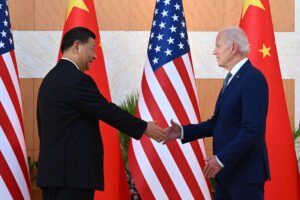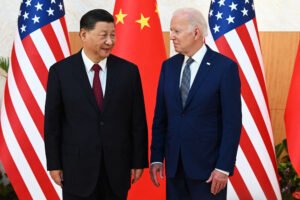In an increasingly challenging relationship, Biden and Xi are seeking clarification.When President Joe Biden and Chinese President Xi Jinping meet on Wednesday in the San Francisco region, they will have no shortage of challenging topics to discuss.
Even if there are little hopes that President Joe Biden and Chinese President Xi Jinping will make significant progress at their meeting, there are plenty of challenging topics to cover when they meet for the first time in a year.
Every leader has specific goals in mind for the eagerly awaited discussions. On the fringes of the Asia-Pacific Economic Cooperation summit on Wednesday, Biden and Xi shared the desire to infuse more stability into a relationship that is now characterised by disagreements over export regulations, hostilities over Taiwan, and conflicts in the Middle East and Europe, among other issues.prosperous year for the two largest economies in the world.
The U.S.-China relationship is no longer limited to meetings concluding with a laundry list of declarations and agreements, as the White House has made clear.
Rather, Biden’s visit to San Francisco is centred on controlling the two nations’ escalating economic rivalry and maintaining channels of communication to avoid miscommunications that can result in open warfare between the two superpowers.

Biden is likely to support US efforts to expand export restrictions on semiconductor chips. In the midst of persistent indications that China’s economy is finding it difficult to recover from the economic disruptions caused by the pandemic, he will reassure Xi that he is not attempting to launch an economic war with Beijing.
“The US has no intention of cutting ties with China. Treasury Secretary Janet Yellen informed Chinese Vice Premier He Lifeng during their meeting this past week that a complete separation of their economies would be economically disastrous for both nations and the world. “We aim to establish a robust economic partnership with China that yields long-term benefits for both nations.”
Military-to-military interactions have essentially stopped since then, although the Biden administration has indicated that it wants to resume them.The first American House speaker to visit Taiwan since Rep. Newt Gingrich in 1997 was House Speaker Nancy Pelosi, who travelled there in August 2022. Beijing promises to unite Taiwan, a self-governing island home to 23 million people, with China, even if it means using force.
Also, the U.S. administration has indicated that it will emphasise that it does not want to see any changes made to the current situation in Taiwan. Washington does not maintain diplomatic ties with Taiwan and acknowledges Beijing as the legitimate government of China. However, Taiwan’s de facto independence has been in place for decades, and China has interpreted US interaction with the island as encouragement to formalise it. The problem is of greater concern as Taiwan gets ready for presidential elections in January.
Additionally, Biden is anticipated to inform Xi of his desire for China to utilise its growing influence over Iran to explicitly state that Tehran or its allies must refrain from taking any actions that would escalate the Israel-Hamas conflict. The Biden administration thinks it has significant power over Iran, which is a major supporter of Hamas, because China is a large buyer of Iranian oil.
Less than a year remains until the US presidential election, and administration officials have stated that Biden will make it plain that Chinese meddling in the process will not be allowed.
Disinformation specialists caution that Beijing may try to attack the United States, causing rifts that could affect local election outcomes, particularly in districts where a significant portion of the electorate is Chinese American.
Xi is hoping Biden will give her some reassurance. Xi is hoping that Biden will declare that the US president will not back Taiwan’s independence, will not ignite a new cold war, and will not stifle China’s economic expansion.
At a symposium held in Hong Kong last week, Chinese ambassador Xie Feng stated, “A good host needs to avoid creating any new trouble or obstacles.”
When Xi and Biden met for the Group of 20 summit in Bali, Indonesia, last November, Beijing’s expectations became evident. But diplomatic relations had hardly returned to normal when the United States shot down a Chinese surveillance balloon in February.
According to Wang Wenbin, a spokeswoman for the Chinese foreign ministry, the two nations now “need to return to what was agreed upon between the two presidents in Bali and truly act on it.”
Regarding the Taiwan issue, Xi warned Biden last year that it was “at the core of China’s core interests, the bedrock of the political foundation of China-U.S. relations, and the first red line that must not be crossed in China-U.S. relations.”This time, Xi would be expecting Washington to take a firm stance against Taiwan’s independence.
Xi stated in Bali that win-win cooperation and conversation, rather than conflict and zero-sum rivalry, should characterise U.S.-China relations. That was a retort to the Biden administration’s dictum that the two countries ought to actively compete without seeking out hostilities. Beijing, believing that the Biden administration’s export restrictions and other steps are intended to impede China’s economic development, has been incensed.

According to Zhu Feng, dean of Nanjing University’s School of International Studies, China now views punitive measures from both the Trump and Biden administrations as “the most important issue.” These measures include tariffs on Chinese goods, sanctions against Chinese companies, and export restrictions on high-tech goods like advanced chips.
According to Zhu, Beijing “will reject and cannot accept those crazy suppression acts of the U.S.” and does not desire a cold war or geopolitical resistance because they harm China’s development.
Reductions in tariffs and sanctions have been demanded by Beijing. But this time, Xi is probably going to ask Biden for a guarantee that the US won’t add more to the list of sanctions against China.
While in San Francisco, Xi is scheduled to speak to American business executives. In addition, Xi will try to increase investor confidence in China since Beijing depends on foreign capital to support economic recovery.
The nation saw a deficit in foreign direct investment from July to September for the first time since 1998, which is concerning. China’s growth over the last three decades has been mostly fueled by foreign investments, so a net outflow might be a sign of Beijing’s incapacity to draw in and hold onto international capital.This article was written by Associated Press researcher Yu Bing in Beijing and writers Kanis Leung in Hong Kong and Ken Moritsugu in Beijing.
All rights reserved. Associated Press, 2023 Reserved rights apply. It is prohibited to publish, broadcast, rewrite, or distribute this content.








1 thought on “Biden and Xi are looking for answers in a relationship that is getting harder and harder.”